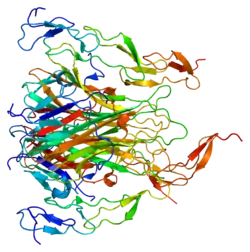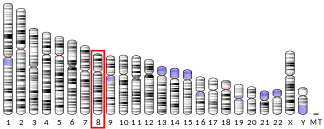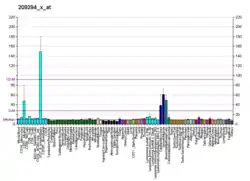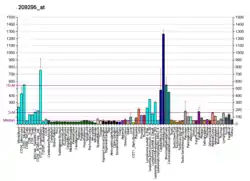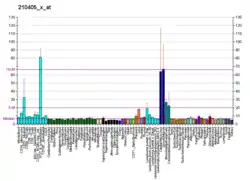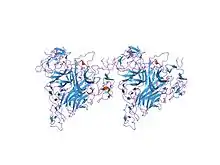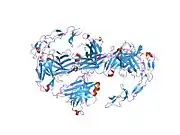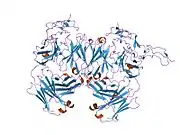Death receptor 5
Death receptor 5 (DR5), also known as TRAIL receptor 2 (TRAILR2) and tumor necrosis factor receptor superfamily member 10B (TNFRSF10B), is a cell surface receptor of the TNF-receptor superfamily that binds TRAIL and mediates apoptosis.
Function
The protein encoded by this gene is a member of the TNF-receptor superfamily, and contains an intracellular death domain. This receptor can be activated by tumor necrosis factor-related apoptosis inducing ligand (TNFSF10/TRAIL/APO-2L), and transduces apoptosis signal. Mice have a homologous gene, tnfrsf10b, that has been essential in the elucidation of the function of this gene in humans. Studies with FADD-deficient mice suggested that FADD, a death domain containing adaptor protein, is required for the apoptosis mediated by this protein.[3]
Interactions
DR5 has been shown to interact with:
Cancer therapy
Monoclonal antibodies targeting DR5 have been developed and are currently under clinical trials for patients suffer from a variety of cancer types, see Tigatuzumab (CS-1008).
Luminescent iridium complex-peptide hybrids, serving as TRAIL mimics, have been designed, which target the death receptors DR4 and DR5 on cancer cells and induce their apoptosis.[10]
References
- GRCh38: Ensembl release 89: ENSG00000120889 - Ensembl, May 2017
- "Human PubMed Reference:". National Center for Biotechnology Information, U.S. National Library of Medicine.
- "Entrez Gene: TNFRSF10B tumor necrosis factor receptor superfamily, member 10b".
- Gajate C, Mollinedo F (Mar 2005). "Cytoskeleton-mediated death receptor and ligand concentration in lipid rafts forms apoptosis-promoting clusters in cancer chemotherapy". J. Biol. Chem. 280 (12): 11641–7. doi:10.1074/jbc.M411781200. PMID 15659383.
- MacFarlane M, Ahmad M, Srinivasula SM, Fernandes-Alnemri T, Cohen GM, Alnemri ES (Oct 1997). "Identification and molecular cloning of two novel receptors for the cytotoxic ligand TRAIL". J. Biol. Chem. 272 (41): 25417–20. doi:10.1074/jbc.272.41.25417. PMID 9325248.
- Chaudhary PM, Eby M, Jasmin A, Bookwalter A, Murray J, Hood L (Dec 1997). "Death receptor 5, a new member of the TNFR family, and DR4 induce FADD-dependent apoptosis and activate the NF-kappaB pathway". Immunity. 7 (6): 821–30. doi:10.1016/s1074-7613(00)80400-8. PMID 9430227.
- Kaptein A, Jansen M, Dilaver G, Kitson J, Dash L, Wang E, Owen MJ, Bodmer JL, Tschopp J, Farrow SN (Nov 2000). "Studies on the interaction between TWEAK and the death receptor WSL-1/TRAMP (DR3)". FEBS Lett. 485 (2–3): 135–41. doi:10.1016/s0014-5793(00)02219-5. PMID 11094155. S2CID 38403545.
- Walczak H, Degli-Esposti MA, Johnson RS, Smolak PJ, Waugh JY, Boiani N, Timour MS, Gerhart MJ, Schooley KA, Smith CA, Goodwin RG, Rauch CT (Sep 1997). "TRAIL-R2: a novel apoptosis-mediating receptor for TRAIL". EMBO J. 16 (17): 5386–97. doi:10.1093/emboj/16.17.5386. PMC 1170170. PMID 9311998.
- Hymowitz SG, Christinger HW, Fuh G, Ultsch M, O'Connell M, Kelley RF, Ashkenazi A, de Vos AM (Oct 1999). "Triggering cell death: the crystal structure of Apo2L/TRAIL in a complex with death receptor 5". Mol. Cell. 4 (4): 563–71. doi:10.1016/S1097-2765(00)80207-5. PMID 10549288.
- Masum AA, Yokoi K, Hisamatsu Y, Naito K, Shashni B, Aoki S (September 2018). "Design and synthesis of a luminescent iridium complex-peptide hybrid (IPH) that detects cancer cells and induces their apoptosis". Bioorganic & Medicinal Chemistry. 26 (17): 4804–4816. doi:10.1016/j.bmc.2018.08.016. PMID 30177492.
Further reading
- Abe K, Kurakin A, Mohseni-Maybodi M, Kay B, Khosravi-Far R (2001). "The complexity of TNF-related apoptosis-inducing ligand". Annals of the New York Academy of Sciences. 926 (1): 52–63. doi:10.1111/j.1749-6632.2000.tb05598.x. PMID 11193041. S2CID 45991330.
- Cha SS, Song YL, Oh BH (2004). "Specificity of molecular recognition learned from the crystal structures of TRAIL and the TRAIL:sDR5 complex". Vitamins and Hormones. 67: 1–17. doi:10.1016/S0083-6729(04)67001-4. ISBN 9780127098678. PMID 15110168.
- Kimberley FC, Screaton GR (Oct 2004). "Following a TRAIL: update on a ligand and its five receptors". Cell Research. 14 (5): 359–72. doi:10.1038/sj.cr.7290236. PMID 15538968.
- Pan G, Ni J, Wei YF, Yu G, Gentz R, Dixit VM (Aug 1997). "An antagonist decoy receptor and a death domain-containing receptor for TRAIL". Science. 277 (5327): 815–8. doi:10.1126/science.277.5327.815. PMID 9242610.
- Sheridan JP, Marsters SA, Pitti RM, Gurney A, Skubatch M, Baldwin D, Ramakrishnan L, Gray CL, Baker K, Wood WI, Goddard AD, Godowski P, Ashkenazi A (Aug 1997). "Control of TRAIL-induced apoptosis by a family of signaling and decoy receptors". Science. 277 (5327): 818–21. doi:10.1126/science.277.5327.818. PMID 9242611.
- Screaton GR, Mongkolsapaya J, Xu XN, Cowper AE, McMichael AJ, Bell JI (Sep 1997). "TRICK2, a new alternatively spliced receptor that transduces the cytotoxic signal from TRAIL". Current Biology. 7 (9): 693–6. doi:10.1016/S0960-9822(06)00297-1. PMID 9285725. S2CID 17740648.
- Walczak H, Degli-Esposti MA, Johnson RS, Smolak PJ, Waugh JY, Boiani N, Timour MS, Gerhart MJ, Schooley KA, Smith CA, Goodwin RG, Rauch CT (Sep 1997). "TRAIL-R2: a novel apoptosis-mediating receptor for TRAIL". The EMBO Journal. 16 (17): 5386–97. doi:10.1093/emboj/16.17.5386. PMC 1170170. PMID 9311998.
- MacFarlane M, Ahmad M, Srinivasula SM, Fernandes-Alnemri T, Cohen GM, Alnemri ES (Oct 1997). "Identification and molecular cloning of two novel receptors for the cytotoxic ligand TRAIL". The Journal of Biological Chemistry. 272 (41): 25417–20. doi:10.1074/jbc.272.41.25417. PMID 9325248.
- Wu GS, Burns TF, McDonald ER, Jiang W, Meng R, Krantz ID, Kao G, Gan DD, Zhou JY, Muschel R, Hamilton SR, Spinner NB, Markowitz S, Wu G, el-Deiry WS (Oct 1997). "KILLER/DR5 is a DNA damage-inducible p53-regulated death receptor gene". Nature Genetics. 17 (2): 141–3. doi:10.1038/ng1097-141. PMID 9326928. S2CID 7037468.
- Schneider P, Bodmer JL, Thome M, Hofmann K, Holler N, Tschopp J (Oct 1997). "Characterization of two receptors for TRAIL" (PDF). FEBS Letters. 416 (3): 329–34. doi:10.1016/S0014-5793(97)01231-3. PMID 9373179. S2CID 83145771.
- Marsters SA, Sheridan JP, Pitti RM, Huang A, Skubatch M, Baldwin D, Yuan J, Gurney A, Goddard AD, Godowski P, Ashkenazi A (Dec 1997). "A novel receptor for Apo2L/TRAIL contains a truncated death domain". Current Biology. 7 (12): 1003–6. doi:10.1016/S0960-9822(06)00422-2. PMID 9382840. S2CID 21645158.
- Chaudhary PM, Eby M, Jasmin A, Bookwalter A, Murray J, Hood L (Dec 1997). "Death receptor 5, a new member of the TNFR family, and DR4 induce FADD-dependent apoptosis and activate the NF-kappaB pathway". Immunity. 7 (6): 821–30. doi:10.1016/S1074-7613(00)80400-8. PMID 9430227.
- Schneider P, Thome M, Burns K, Bodmer JL, Hofmann K, Kataoka T, Holler N, Tschopp J (Dec 1997). "TRAIL receptors 1 (DR4) and 2 (DR5) signal FADD-dependent apoptosis and activate NF-kappaB". Immunity. 7 (6): 831–6. doi:10.1016/S1074-7613(00)80401-X. PMID 9430228.
- Pai SI, Wu GS, Ozören N, Wu L, Jen J, Sidransky D, El-Deiry WS (Aug 1998). "Rare loss-of-function mutation of a death receptor gene in head and neck cancer". Cancer Research. 58 (16): 3513–8. PMID 9721851.
- Arai T, Akiyama Y, Okabe S, Saito K, Iwai T, Yuasa Y (Nov 1998). "Genomic organization and mutation analyses of the DR5/TRAIL receptor 2 gene in colorectal carcinomas". Cancer Letters. 133 (2): 197–204. doi:10.1016/S0304-3835(98)00230-4. PMID 10072170.
- Mongkolsapaya J, Grimes JM, Chen N, Xu XN, Stuart DI, Jones EY, Screaton GR (Nov 1999). "Structure of the TRAIL-DR5 complex reveals mechanisms conferring specificity in apoptotic initiation". Nature Structural Biology. 6 (11): 1048–53. doi:10.1038/14935. PMID 10542098. S2CID 6604122.
- Hymowitz SG, Christinger HW, Fuh G, Ultsch M, O'Connell M, Kelley RF, Ashkenazi A, de Vos AM (Oct 1999). "Triggering cell death: the crystal structure of Apo2L/TRAIL in a complex with death receptor 5". Molecular Cell. 4 (4): 563–71. doi:10.1016/S1097-2765(00)80207-5. PMID 10549288.
- Kuang AA, Diehl GE, Zhang J, Winoto A (Aug 2000). "FADD is required for DR4- and DR5-mediated apoptosis: lack of trail-induced apoptosis in FADD-deficient mouse embryonic fibroblasts". The Journal of Biological Chemistry. 275 (33): 25065–8. doi:10.1074/jbc.C000284200. PMID 10862756.
- Trauzold A, Wermann H, Arlt A, Schütze S, Schäfer H, Oestern S, Röder C, Ungefroren H, Lampe E, Heinrich M, Walczak H, Kalthoff H (Jul 2001). "CD95 and TRAIL receptor-mediated activation of protein kinase C and NF-kappaB contributes to apoptosis resistance in ductal pancreatic adenocarcinoma cells". Oncogene. 20 (31): 4258–69. doi:10.1038/sj.onc.1204559. PMID 11464292.
External links
- TNFRSF10B+protein,+human at the US National Library of Medicine Medical Subject Headings (MeSH)
This article incorporates text from the United States National Library of Medicine, which is in the public domain.
